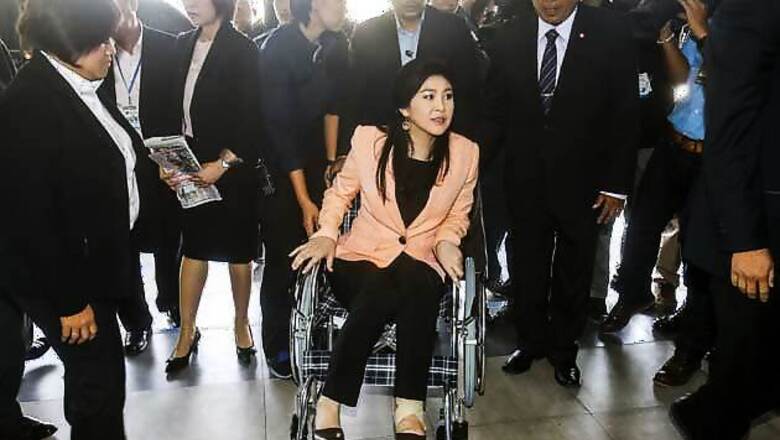
views
Thailand's government is to lift a state of emergency in Bangkok and surrounding provinces two months after imposing it to curb anti-government protests, as the security situation has improved due to the dwindling number of demonstrators.
The protesters, mainly from Bangkok and the south, have been trying since early November to overthrow Prime Minister Yingluck Shinawatra and rid the country of the influence of her brother, ousted former premier Thaksin Shinawatra.
Twenty-three people have been killed, most in shootings and grenade blasts, but the protests have waned in recent weeks and are now mostly confined to Lumpini Park in Bangkok's central business district and a few other sites.
"We have agreed to lift the state of emergency and use the Internal Security Act starting from tomorrow until April 30 as the number of protesters has dwindled ... and after pleas from the business community," national security chief Paradorn Pattanathabutr told Reuters.
The Internal Security Act is a less harsh law but still allows the authorities to impose curfews, operate security checkpoints and restrict the movement of protesters as needed.
The decision was taken at a cabinet meeting held in Nakhon Pathom province, about 80 km (50 miles) from Bangkok. Yingluck arrived in a wheelchair after slipping as she stepped out of a car on Saturday in the northern city of Chiang Mai.
The government set the 60-day emergency from January 22 to help contain protests in the run-up to a general election on February 2, but most of its measures were barely used, especially after a court ruled on February 19 that some had been imposed illegally.
The election in February was disrupted by protesters in almost 70 of the 375 constituencies, leaving the House of Representatives without a quorum to open and elect a new prime minister.
The Constitutional Court has accepted a petition to consider annulling the election, which could further delay the formation of a new government.
Yingluck, whose Puea Thai Party had been expected to win the election, heads a caretaker administration with limited powers. She faces a slew of legal challenges that could bring her down, including a charge of dereliction of duty over a rice subsidy scheme that owes money to hundreds of thousands of farmers.
Tourism has suffered during the unrest. Arrivals were down 4.1 per cent in January and February compared to the same period last year, according to the Ministry of Tourism and Sports.
Both the stock market and baht currency rose very marginally on the government's move, though it was enough to take the baht to a three-month high.
"Lifting the emergency law should have a positive impact on businesses. Many really felt the pinch and lost customers because the state of emergency was in place, including tour operators who saw huge cancellations," said political analyst Kan Yuenyong at Siam Intelligence Unit.
"It should also improve the state's image because rights groups tend to view the emergency law as draconian. But, ultimately, no law can help the government contain the protests if they flare up again."
















Comments
0 comment